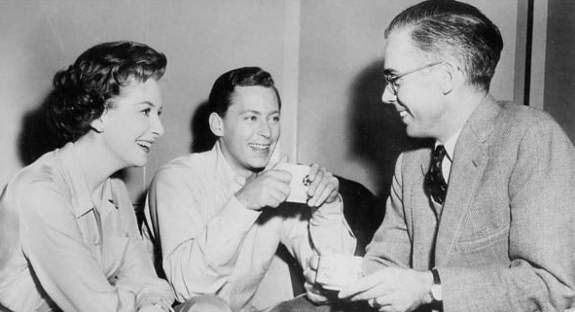Coming to the end of 2022, here is a selection of random letters, written by a few of my fave actors and a fave director.
First up is a letter from Barbara Stanwyck to Miss Cunningham (a fan) about the making of
Banjo on My Knee (1936). Barbara writes how she and her colleagues had enjoyed making the film.
Banjo on My Knee is the first film in which Barbara sings on screen. While she wanted to be dubbed —"
I have a deep husky voice without a high note in it", Barbara had warned beforehand— producer Darryl Zanuck insisted that she would do her own singing. (There's a lovely duet by Barbara and Tony Martin, to be watched
here). Apart from
Banjo, Barbara
also sings in
This is My Affair (1937) and
Lady of Burlesque (1943) but her voice was dubbed in
Ball of Fire (1941).
Transcript:
Jan 10/37
Dear Miss Cunningham —
Thanks for your nice letter. I'm glad you liked "Banjo" - we all liked making it - we just had fun with all the hard work.
The filming took thirty-one days, that's about average time with the exception of epics and they go on forever.
My hair is dark red - eyes blue- and there you have it.
I do appreciate your taking the time to write me and hope you will continue to like my work.
Thank you,
Barbara Stanwyck
 |
Barbara Stanwyck in the door opening of her trailer during production of Banjo on My Knee.
_____ |
In October 1938, Norma Shearer wrote to her fans, Mr and Mrs Layton, about Marie Antoinette (her "most loved role"), while next touching on the subject of Cleopatra and her new film Idiot's Delight co-starring Clark Gable.
 |
| Above: Norma Shearer and Tyrone Power in a scene from Marie Antoinette (1938), directed by W. S. Van Dyke. Below: Norma with Clark Gable in Clarence Brown's Idiot's Delight (1939). |
Next is another letter to a fan, this one is from Alfred Hitchcock to a Mr Parker, dated 21 April 1941. Hitch reacts to a suggestion from Mr Parker to have the audience solve the murder mystery. The film Before the Fact mentioned in the letter would be released under the name Suspicion (1941).
 |
On the set of Suspicion with the leads Cary Grant, Joan Fontaine and director Alfred Hitchcock.
_____
|
In March 1971, Doris Day wrote this lovely letter to friend and fellow actress Mary Wickes. The two women appeared together in four movies, i.e. On Moonlight Bay (1951), I'll See You in My Dreams (1951), By the Light of the Silvery Moon (1953) and It Happened to Jane (1959). Wickes also guest-starred on the first season of the tv series The Doris Day Show (1968).
.jpg) |
| A candid photo of Mary Wickes and Doris Day |
 |
Doris and Mary in By the Light of the Silvery Moon (1953) _____ |
Cary Grant wrote the following note to fellow actor and friend Clifton Webb, signing it "Betsy and Cary". Betsy Drake, an actress and writer, was Grant's third wife and they were married from 1949 until 1962.
Transcript:
Monday- 29th
Clifton —
It's so nice to know someone, in this seldom considerate, and usually selfish, world, who is kind courteous and undemanding. You have our affection, dear Clifton!
Betsy and Cary
Chrysanthemums are so impressive and colorful this time of the year that we thought we'd accompany this note with a few for your mother and you.
B and C.
 |
| Cary Grant and Betsy Drake in 1958 |
 |
1935, Cary Grant and Clifton Webb and some friends/fellow actors, among them Claudette Colbert and Marlene Dietrich.
_____ |
The final letter for this post was written by Deborah Kerr to her friend Radie in May 1990. In it, Kerr talks about Greta Garbo and Garbo's last visit to Klosters (Switzerland), the Alpine village in which Kerr and her second husband, novelist/screenwriter Peter Viertel, had settled since they got married in 1960. Viertel's mother was Salka Viertel —an actress/screenwriter and a very close friend of Greta Garbo— who, in order to be near her family, had also moved to Klosters. Garbo was a regular visitor there and even after Salka's death in 1978 she kept visiting Klosters during the summer months, her last visit being in 1988. (Incidentally, the Viertels also had a house in Marbella (Spain) from where Kerr wrote her letter.)
Tea and Sympathy (1956) mentioned in Kerr's letter is a Vincente Minnelli film, in which Kerr co-starred with John Kerr. The film was based on the 1953 stage play of the same name, written by Robert Anderson. I assume Kerr is referring to Anderson when she talks about "Bob".
 |
Deborah Kerr and Peter Viertel — the couple got married in 1960 and remained married until Kerr's death in 2007.
|
 |
Deborah Kerr with co-star John Kerr from Tea and Sympathy and Robert Anderson (right) who wrote the original play.
HAPPY 2023, EVERYONE!! |







.jpg)








.jpg)
.jpg)

































